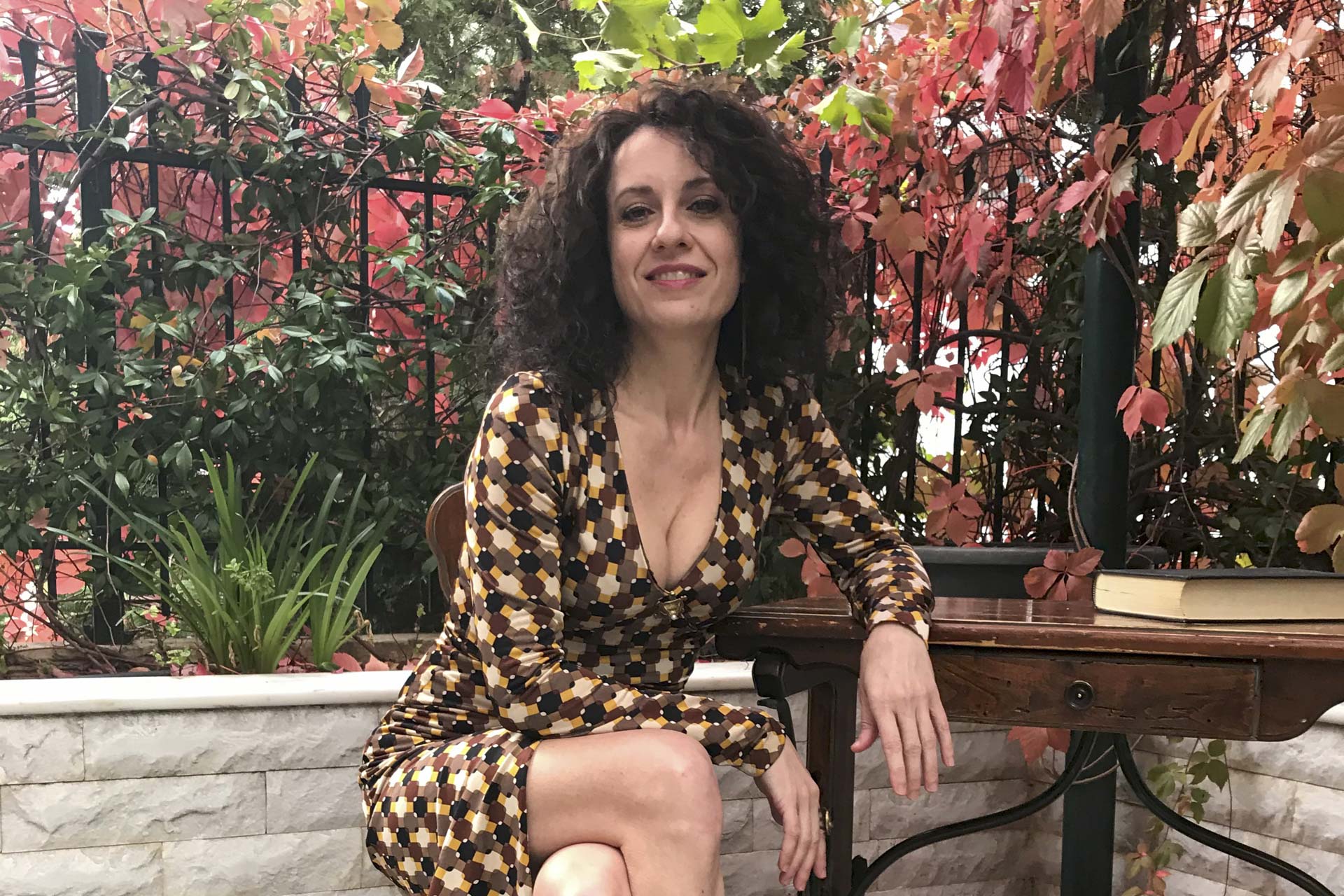Irini Konstantinidi has nothing to lose

EN / NL
Irini Konstantinidi’s debut album will be released soon. The jazz vocalist residing in Athens took some time. She had been working as a jazz vocalist for some time, but decided to get her Masters Jazz Vocals first. After she completed her study in The Hague now is teh time for the release. The Deluxe DigiPack first album Nothing To Lose will appear April 2, 2021.
JAZZRADAR had a chat with her.
“This album is really good – tunes are nice, the band sounds great, Irini is very releaxed. This music deserves to be heard ”! Those are David Liebman’s words of praise for Irini Konstantinidi’s debut album, which will be released on April 2, 2021.
How did you bump into Liebman?
After a decade that I had already been working as a jazz vocalist in my hometown Athens, Greece, I decided to fulfill my long-awaited dream of doing my Master’s studies in The Netherlands. So in 2016, I was accepted into The Royal Conservatoire in The Hague as a Master’s student in Jazz Vocals and I moved to Holland. I was fortunate to have amazing teachers and one of them, Dutch renowned jazz drummer Eric Ineke introduced me to Dave Liebman.
I interviewed him for my Master’s Thesis and since then, we have been keeping in touch. He even posted this interview on his own website! Liebman is a jazz legend that offers his feedback generously and he cares a lot about the music and how jazz education and music are evolving.
The album is called “Nothing to lose”. Which sounds a bit like “all or nothing”, or “now or never”. That title sounds quite desperate, while the title song – own composition and lyrics – feels cheerful and hopeful.
What’s up with that? How bad is it? Are you desperate? What do you want to say with the album?
Hahaha! No! Not desperate at all! The complete opposite! From my viewpoint the title “Nothing to lose” symbolizes the freedom to choose what feels right without fear or hesitation. The cheerful introductory pattern came to my head during a walk under the summer sun of Athens, right before I moved to Holland for my Master’s studies. I was happy and satisfied that I was going to make a big change in my life, move to another country and fulfill my dream. A dream of traveling and living abroad that I had since 2006 when I finished my jazz studies in Athens. But you know how it is… you start working, playing music, getting established in the scene, starting to teach and all of a sudden 10 years have passed. But the dream was still burning like a little flame. In the summer of 2016, I was joyful with my decision to take a break from the career I had already established in Athens and start from scratch in a new city. Start a new life, meet new challenges, complete my studies with a Master’s degree and expand my horizon and network in the jazz industry. I had nothing to lose! As I say in the lyrics of this song, life is a journey, why not take a ride?
Five of the new album’s ten songs are entirely by Konstantinidi. Besides the closing song Smile, she is responsible for the lyrics. The lyrics seem autobiographical and reflect personal events and experiences.
What is a concrete experience translated into a text?
How does that take shape and where or how does a melody arise?
Good question. I suppose that when lyricists write, they want to speak about something that had some kind of influence on them consciously or subconsciously. In my case, I always write lyrics that have to do with experiences of mine that had a big impact of course, worthy of being transformed into a song. I try to take any positive or negative feeling or experience and translate it into words. Thoughts, ideas, emotions, or just philosophical questions about how I can achieve having a meaningful life. Until now I have only been able to write the melody first. The lyrics come later to tell the story of the song.
So for example, when I’m feeling energetic and optimistic, I am envisioning how I want my life to be and then I write a song about it. That’s what my song “Spicy life” is all about! The melody always comes first and it is a reflection of my mood. I record my initial musical idea on my phone so that I don’t forget it and later I develop the melody, while I’m trying out ideas on the piano. The lyrics come at the end of the process and they are just completing the story that the melody is insinuating or very clearly demonstrating!
Four compositions on the album are by composer and multi-instrumentalist Roman Gomez. Gomez plays the piano on two songs and on one song he plays the bandoneon.
Gomez is from Argentina. How did he come across your path?
I met Roman in 2014 at a concert in Athens where he was playing music with a singer-friend of mine. He had been living in Athens for some years and he could already speak Greek very well! He is a fantastic composer and multi-instrumentalist, he plays piano, guitar and bandoneon! His compositions are a beautiful blend of his Argentinian roots along with Brazilian music and with a clear influence from classical and jazz music. He was very enthusiastic about me writing lyrics and singing his compositions so I was immediately exposed to a huge collection of his work, being free to choose the pieces that “spoke” to me. The lyrics I wrote for his melodies were written in 2015, before I moved to Holland. I was happy to perform these songs along with most of my own, during my final Master’s recital at The Royal Conservatoire in May 2018 as well as at the “Summertime Festival” in the summer of 2018 in Grote Markt in The Hague! This was a very successful and enjoyable event! The songs had already started taking their final shape but they still had to wait 2 more years until I got to record them officially in the studio for my current album release.
Irini Konstatinidi lived in the Netherlands from 2016 to 2020. She did her Masters in Jazz Vocals at the Royal Conservatory of The Hague. And she speaks good Dutch.
How did you end up in the Netherlands and why did it become The Hague? And who were your inspirers there?
As I mentioned earlier, it had been a dream of mine to live and study in The Netherlands. By 2006 that I finished my jazz studies in Athens, I had many friends-musicians that had already started or almost concluded their studies in the Conservatories of Amsterdam and The Hague. I had traveled there to visit them and I was impressed by how well organized these schools were. So when the time was right for me (ten years later!) and after working as a jazz vocalist and jazz vocals teacher in Athens, I decided to take a break and move to The Hague. During one of my prior visits to the city, I had already met one of the jazz vocals’ teachers Anka Koziel as well as the Head of the Jazz Department of the Royal Conservatoire at that time Wouter Turkenburg. Being a lot older than the average students and already having a professional jazz career for quite some years, I was very lucky and grateful to be warmly accepted to attend the Masters in Jazz curriculum in 2016, which I concluded two years later in 2018. Since I was a Master’s student doing research about “Jazz Phrasing and Interplay and how can phrasing be the tool of the vocalist to stimulate interplay within a jazz combo”, I was able to have multiple teachers even of different instruments than vocals. So I got to broaden my knowledge by learning from many inspiring teachers, like acclaimed American saxophone player John Ruocco and the renowned Dutch jazz musicians drummer Eric Ineke and trumpet player Jarmo Hoogendijk among others. Eric introduced me to Dave Liebman, as I mentioned earlier and I also connected via skype with the famous Dutch bassist and author Hein van de Geyn. Eric and Hein were also interviewed by me for my master’s thesis about Phrasing and Interplay along with David Liebman and you can read/listen to these amazing jazz legends answering my questionnaire in the form of three very interesting conversations, if you visit the Jazz Blog of my website.
Your album features a guest role for Hermine Deurloo (codarts harmonica teacher). How did that collaboration go and how did it come about?
Hermine is an amazing musician and a very sweet and generous person. The way we got connected is very interesting and proves that whenever someone envisions something, they should be ready to move the earth and the sky, in order to achieve it! I will explain myself right away! For this piano-voice duet piece by Roman Gomez with the title “Unusual romance”, I was thinking of inviting a soloist to play as a guest but I didn’t know yet which instrument would match the sound and atmosphere of the song. At some point when I was listening to the amazing music of Toots Thielemans, it came to my head! I needed that sweet and nostalgic sound of a chromatic harmonica to complete the atmosphere of this slightly melancholic love song. There are not many harmonica players around so my partner who is Dutch and a jazz lover (thank God for that!) made the first contact with Hermine by email and sent her the rough mix of the recording of this song, explaining the situation! Hermine replied very quickly and immediately agreed to record her harmonica solo part for this song! This was an amazing surprise and incredible “gift” from my Dutchman, of course, since I had no idea about what he was up to! When he told me the happy news, I instantly connected with Hermine via email, to thank her and talk further about the musical and technical details as well as what I had envisioned for the song. We were in Athens of course and she was in Amsterdam so she basically recorded by herself, listening to the rough mix from my studio recording. But this is quite a common practice if musicians from all over the world want to collaborate and especially in these times of social distancing and travel restrictions, it is a very good idea, if nothing else can be done. What is most important is that a musician like Hermine Deurloo got to know me, appreciated my singing and we are now connected, having established a more personal communication, even though from afar. This is how one can slowly build a very good and effective network. All of us musicians, especially in such hard times of not being able to play gigs, etc, take comfort in keeping in contact and exchanging ideas, music, etc. I still have contact via email with Sheila Jordan after meeting her in 2004 in a Masterclass she gave in Athens when she had visited for a number of concerts! She is always very sweet and supportive, giving me her feedback about my music and singing, every time I send her something of mine! She already told me she found “Nothing to Lose” wonderful and my singing beautiful and heartfelt. I can’t wait to get more detailed feedback from her soon!
You often see that conservatory students form a band together and (in this case) stay in the Netherlands. After your studies in The Hague, you returned to Athens. You made the record there with Greek musicians. What’s up with that? Does Athens, Greece have a solid jazz scene?
As I mentioned before I was already working as a jazz vocalist and educator before I moved to The Hague. So my network in Athens had strong foundations and I had some steady collaborations with musicians, bands, etc. Since I was already a professional and experienced musician, I didn’t have the great need to book each and every gig I could get, in order to practice myself playing with other musicians and being exposed to the public. In The Netherlands, I played music and collaborated with many musicians from all over the world and usually the ones that were a bit closer to my age and were already living there for several years before me. I had the opportunity to play in theaters, in smaller jazz clubs and in private parties such as some receptions held in Kasteel de Wittenburg in The Hague. I was honored and happy to sing at the private surprise party for a retiring member of the National Dance Theater! It was a beautiful party with loads of jazz live music from the band I formed especially for the occasion and fantastic NDT dancers, enjoying the festive afternoon!
But apart from all the exciting experiences of meeting and playing with all these amazing international musicians, the warmer and sunnier climate of Athens had started calling me back. And when the Covid crisis started and the first lockdown was imposed in March of 2020, one year ago, I started feeling uncomfortable. It was then that I wrote the lyrics for one more of Roman’s compositions and named it “Homeward Bound”. It speaks about my wish to return back home. And that’s why I chose to place it towards the end of the album.
So given the difficult circumstances in this unprecedented situation, my partner and I decided to move to Athens and here we are since the summer of 2020! Despite the restrictions of the pandemic, I managed to gather the musicians that would match greatly with my music and we got in the amazing studio Sierra in Athens to record the album, in November right before the second very long lockdown was imposed. And to answer your question finally… yes, Greece has a constantly growing jazz scene and musicians that are very talented. The audience is not as large as we would like it to be but that’s one more reason that I wanted to return. I believe that I have a lot more to offer in my country by contributing my knowledge and experience in jazz education and by helping expand the jazz audience with my music. There are many people here (in Greece) such as musicians, journalists, and other members of the music industry with the same vision. Many of them had also studied in The Netherlands and have a big network too. So we are optimistic that we will be able to make it happen! Jazz is a universal community and the conversation should be open and non-stop on a worldwide scale.
Your knowledge of Dutch is (still) very good. You seem to be practicing it… ..
Will we see you again in the Netherlands?
Of course!!! As soon as the travel restrictions get lighter, I intend to visit The Netherlands very often! I have friends there and the family of my partner is there, of course, so The Netherlands is like my second home! I’m also maintaining good ongoing contact with my teachers from The Royal Conservatoire and especially drummer Eric Ineke as well as with the new Head of the Jazz Department, singer Susanne Abbuehl that does a great job in her new and extremely demanding role! I wish to meet with all of them when I visit The Hague and get a chance to also admire the new amazing building of the Royal Conservatoire that will be finished soon hopefully! Regarding my Dutch, I have to admit that I’m way better in the written speech than in oral speech, so I hope that if we ever get to speak on the phone, you will switch into English for the sake of our conversation!
In Game for Two you sing about the rules that apply. What rules apply to you when it comes to music?
Music for me is a Goddess and the absolute leader. When Music needs or requires something, like a certain arrangement, a particular instrument, a change in dynamics, more space at some point… I try to have my “ears” open to hear what that something actually is. What I detest the most is when people “use” music to promote their inflated egos, they find music as a way to project their narcissistic personalities or even cover possible inferiority complexes. For example, when a musician makes such “bad use” of the music, sometimes it appears that they care more about their own image and how they are presenting themselves rather than being the faithful “servant” of the Music. This happens when for example one plays a huge solo not taking into consideration whether the flow of music really needs such an approach at that specific moment. It is desirable of course that musicians are fully expressing themselves during music playing especially in a live show but there is a thin line between “the magic of the moment” and a complete detachment from the overall musical praxis. We usually play with other musicians that form the group, so we must really bear in mind that the musical conversation that hopefully is taking place needs to enrich this collective artistic activity and of course fulfill the music and its subtle purpose. The purpose of the music is to emotionally move us, in whatever possible way one can be emotionally moved. A dry “show off” demonstrating technical virtuosity for example offers very little pleasure to a human being that wishes to live a powerful musical experience and get some emotions moved inside rather than intellectually counting the size of the musician’s technical capability. So my utmost rule in music is that when I play or listen to music, something has to move inside me, emotion has to be stirred, the truth must be told. When I listen to something detached and sterile with the sole intention of provoking superficial “Wow” reactions, the only emotion that arises within me is boredom, I’m afraid.
Music has a magical way to speak in our soul and musicians should only care for bringing their soul out and expose it as it really is, nude and sincere. It is an act that requires a lot of courage and self-observation but who said that Music is an easy thing to do?
In Waltz of Broken Dreams you sing that your heart is open to new dreams. What musical dreams do you have?
Well, I suspect that I will not be very original in this answer of mine since I think that the dream of any musician is to meet and get the opportunity to play some music with his/her musical heroes! So for me, these musicians that are a major inspiration and influence (even though not obviously reflected in my music) are Wayne Shorter and his amazing trio with Danilo Perez, John Patitucci and Brian Blade. It is common knowledge that Wayne Shorter is one of the most innovative and influential jazz musicians of all time. What I love about his music since his recordings with Miles Davis’ second great quartet with Herbie Hancock, Ron Carter and Tony Williams, is how he values melody. Miles Davis also… I am truly awed to listen to this amazing quintet, especially in the videos from live performances during the 60’s and how they were all five of them interacting like one single unity. This in my opinion is the epitome of Music being the one and only Muse for the musicians on stage! In Wayne’s more recent recordings like “Beyond the sound barrier”, I cannot help but admire the conversation of the instruments establishing that new sound with such innovative approach! And I was fortunate to watch Wayne Shorter and his latest trio (Perez, Patitucci, Blade) in Athens 10 years ago. This was an experience I will never forget! I hope I will be blessed to record some of my favorite Wayne Shorter compositions with the lyrics I wrote especially for these pieces, in the near future.
Another dream that one might say is a bit more realistic (hahaha) is that I wish to always have inspiration to create music and enjoy playing it with talented musicians. I am grateful that I have experienced this feeling of fulfillment during the recording of my album “Nothing to lose”. And last but not least, a dream or a sort of ambition of mine is to be able to contribute to the expansion of the jazz music and its larger exposure on an ever-growing audience worldwide and especially in my country Greece, where jazz is not very popular yet.
EN / NL
Interview: Eddy Westveer


